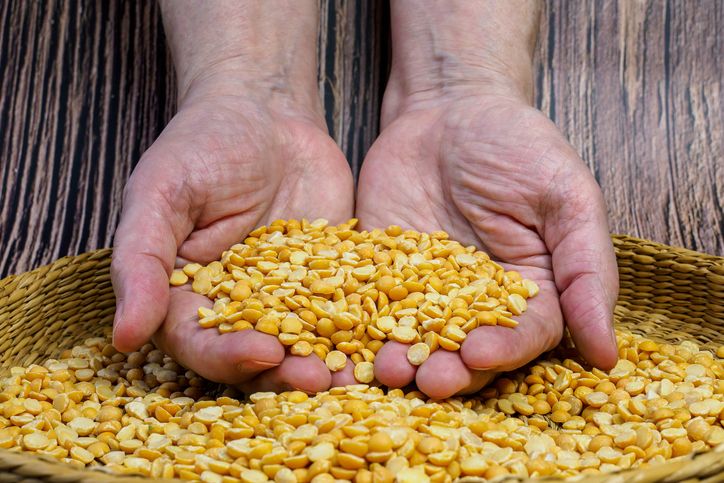Seven months after warning that the future of the US pea protein industry was in “grave peril” thanks to a flood of cheap imports from China, leading US producer PURIS is claiming an initial victory after the US Department of Commerce (DOC) announced hefty preliminary duties on certain Chinese pea protein imports.
The news came a day after ag commodity trader Louis Dreyfus Company announced plans to build a new pea protein isolate facility at its complex in Yorkton, Saskatchewan, Canada, expected to be operational in late 2025.
Chinese high-protein-content pea protein sold in US at ‘less than fair value’
In a preliminary determination seen by AgFunderNews, the DOC said it had found that Chinese pea protein is being sold in the US at “less than fair value” and said it would implement preliminary duties on dumped imports of high protein content (HPC) pea protein of between 112% and 270%.
It follows a preliminary determination from the US International Trade Commission (ITC) which found there was “a reasonable indication” Chinese companies were dumping HPC pea protein in the US “at less than fair value and subsidized by the government of China.”
The DOC and ITC probes follow a petition filed last July by leading PURIS, which claims it was forced to lay off workers at its plant in Turtle Lake Wisconsin last year as a “direct result of dumped and subsidized imports from China” and had scaled back production at its new plant in Dawson, Minnesota.
“For years, unfair trade practices threatened the future of American pea protein manufacturers. The Department of Commerce stood up for American jobs and ingenuity, sending a clear message that dumping and unfair trade tactics won’t be tolerated.” Tyler Lorenzen, CEO, PURIS
What is dumping? According to the International Trade Commission (ITC): “Dumping occurs when a foreign producer sells a product in the US at a price that is below that producer’s sales price in the country of origin, or at a price that is lower than the cost of production.”
What is an unfair government subsidy? Says the ITC: “Foreign governments subsidize industries when they provide financial assistance to benefit the production, manufacture, or exportation of goods. Subsidies can take many forms, such as direct cash payments, credits against taxes, and loans at terms that do not reflect market conditions. The statute and regulations establish standards for determining when an unfair subsidy has been conferred. The amount of the subsidies that the foreign producer receives from its government is the basis for the rate by which the subsidy is offset, or ‘countervailed,’ through higher import duties.”
What are antidumping and countervailing duties? Says the ITC: “Antidumping and countervailing duties are intended to offset the value of dumping and/or subsidization, thereby leveling the playing field for domestic industries injured by such unfairly traded imports.”
Anti-dumping duties effective next week
Speaking to AgFunderNews this week, PURIS corporate development manager Zachary Hubert explained: “There are two ongoing [DOC] investigations. The first determines whether a foreign producer or exporter is dumping. The second determines whether or not the foreign producers or industries are subsidized by the Chinese government.
“In December 2023, the DOC made an affirmative determination that Chinese producers were being subsidized by the Chinese government and announced countervailing duties from 15-343%. This week, it announced an affirmative determination confirming dumping by Chinese producers and exporters and announced anti-dumping duties from 112-270%.”
According to Hubert, the antidumping duties are effective when published in the Federal Register (expected next week), while countervailing duties were implemented in December.
In both preliminary determinations – antidumping and countervailing – the DOC “announced a finding of critical circumstances [when exporters flood the US market with imports of a product subject to an ongoing investigation],” explained Hubert. “This imposes retroactive duties on products imported in the 90 days preceding the preliminary determinations.”
Final determination expected this summer
So what happens next, given that the determinations thus far are ‘preliminary’ in nature?
According to Hubert, parties involved in the proceeding now have an opportunity to review and comment before a final determination is made, likely in late June or early July.
He added: “Commerce’s determination is a commitment to fair trade and key to protecting American jobs. Dawson is North America’s largest pea protein facility and is designed to service both near and long-term demand with the ability to double capacity. As consumers demand transparency around the food they eat, our facilities are ready and able to offer the industry with high-quality ingredients.”

Pea protein production capacity in North America
While pea protein still lags behind soy in the plant-based protein stakes, North American production capacity has been expanding rapidly in recent years, with PURIS opening a plant in Dawson, Minnesota; Ingredion opening a facility in Nebraska; ADM opening a plant in North Dakota; Roquette opening a plant in Portage la Prairie, Manitoba, Canada, and now Louis Dreyfus Company announcing a new plant in Saskatchewan expected to come online in late 2025.
At the same time, PricewaterhouseCoopers (PwC) has yet to announce a buyer for the assets of Merit Functional Foods, a pea and canola protein processor which went into receivership in March 2023 just two years after opening a state-of-the art plant in Winnipeg, Canada.
‘PURIS was forced to idle its operations at Turtle Lake as a direct result of dumped and subsidized imports from China’
According to PURIS’ July 2023 petition, China’s production of pea starch has been steadily rising. As there is relatively low demand for the pea protein coming out of the starch facilities, it is being sent to the US at bargain basement prices.
“There is compelling evidence that Chinese imports have undersold the domestic industry prices throughout the period of investigation,” claimed PURIS. “Domestic producers have been forced to [REDACTED], idle facilities, and lay off American workers due to an increase in unfairly traded imports from China. As a result of these developments, the future of the domestic industry is in grave peril.”
It added: “Recently, due to dumped and subsidized imports, PURIS was forced to idle its operations at Turtle Lake [Wisconsin] and concentrate its remaining HPC pea protein production in Dawson, Minnesota [where PURIS opened a new plant in 2021]. The presence of dumped and subsidized imports from China has made it impossible for domestic producers like PURIS to obtain a fair rate of return on their pea protein facilities.”
PURIS: ‘Pea protein is the staple ingredient powering innovation in all aisles’
According to Hubert at PURIS, there are multiple applications for pea protein, which is being used in everything from protein smoothies and shakes to sports nutrition products and protein powders, plant-based protein bars and snacks, and plant-based meat-, egg-, and dairy alternatives.
Declining US retail sales of meat alternatives notwithstanding, he said, demand for pea protein remains strong. “Plant-based meat represents less than 15% of the [pea protein] category and its trends are not indicative of the category as a whole. We continue to see positive growth in plant-based nutrition. Consumers are increasingly reaching for plant-based items in the grocery store and pea protein is the staple ingredient powering innovation in all aisles. Pea is the fastest growing protein in new product launches.”
Asked to comment on the news from Louis Dreyfus Co, he said: “The announcement shows a commitment to the ongoing plant-based protein transition. We see long-term tailwinds for the industry.”
Roquette: Ruling will help level the playing field
Roquette, which opened a large pea protein plant in Portage la Prairie, Manitoba, in 2021, told us last year that it had had to realign production schedules at the plant to reflect weaker demand.
Commenting on this week’s news from the DOC, head of communications and public affairs, Americas, James P. Bozikis told us: “We’re encouraged by the Department of Commerce’s preliminary determination in its anti-dumping case against Chinese pea protein imports. This ruling should, in fact, eliminate any unfair competitive advantage, help to level the playing field and create fair trade for everyone in this industry.”





